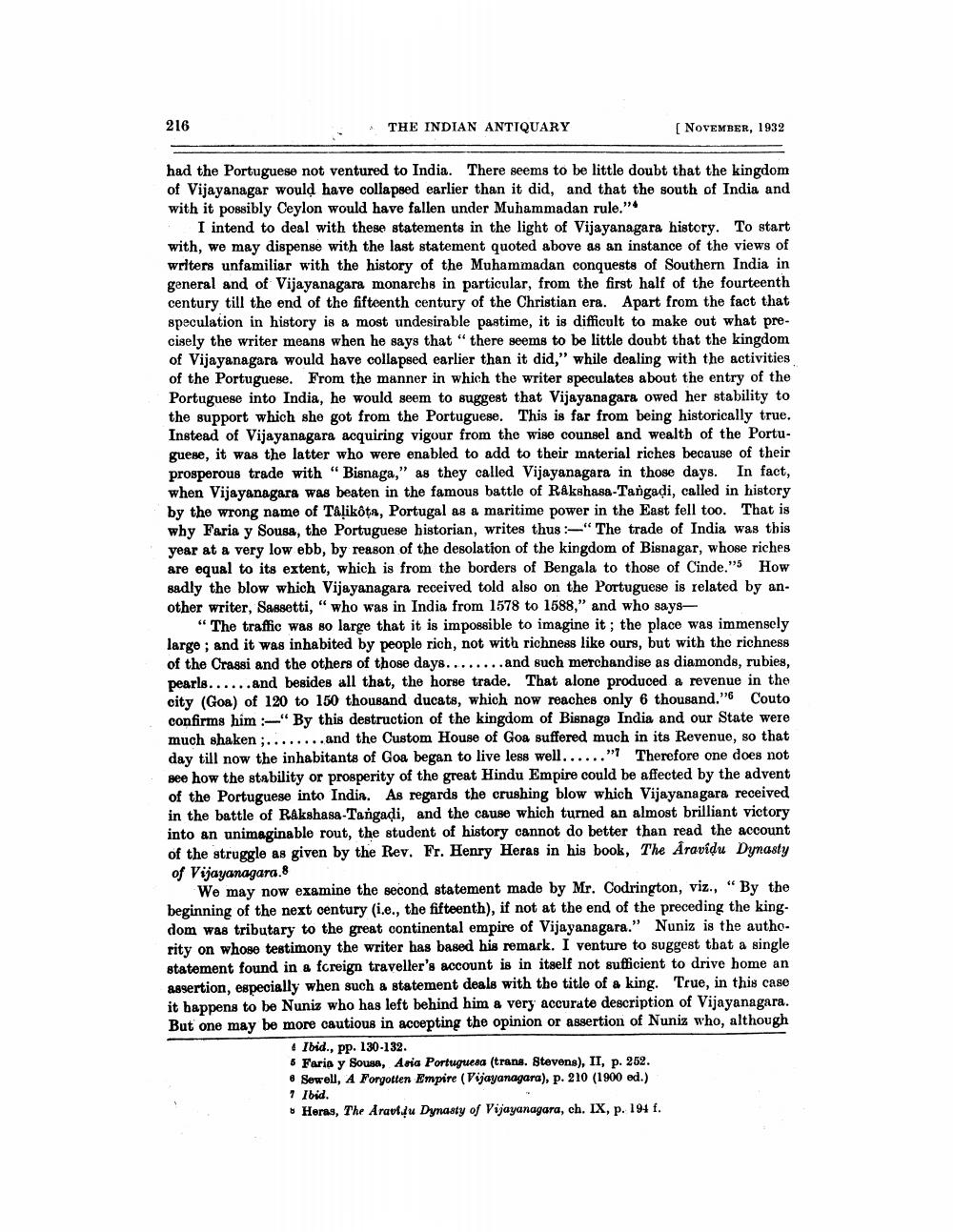________________
216
THE INDIAN ANTIQUARY
[ NOVEMBER, 1932
had the Portuguese not ventured to India. There seems to be little doubt that the kingdom of Vijayanagar would have collapsed earlier than it did, and that the south of India and with it possibly Ceylon would have fallen under Muhammadan rule."
I intend to deal with these statements in the light of Vijayanagara history. To start with, we may dispense with the last statement quoted above as an instance of the views of writers unfamiliar with the history of the Muhammadan conquests of Southern India in general and of Vijayanagara monarchs in particular, from the first half of the fourteenth century till the end of the fifteenth century of the Christian era. Apart from the fact that speculation in history is a most undesirable pastime, it is difficult to make out what precisely the writer means when he says that "there seems to be little doubt that the kingdom of Vijayanagara would have collapsed earlier than it did," while dealing with the activities of the Portuguese. From the manner in which the writer speculates about the entry of the Portuguese into India, he would seem to suggest that Vijayanagara owed her stability to the support which she got from the Portuguese. This is far from being historically true. Instead of Vijayanagara acquiring vigour from the wise counsel and wealth of the Portuguese, it was the latter who were enabled to add to their material riches because of their prosperous trade with "Bisnaga," as they called Vijayanagara in those days. In fact, when Vijayanagara was beaten in the famous battle of Rakshasa-Tangadi, called in history by the wrong name of Talikota, Portugal as a maritime power in the East fell too. That is why Faria y Sousa, the Portuguese historian, writes thus :-"The trade of India was this year at a very low ebb, by reason of the desolation of the kingdom of Bisnagar, whose riches are equal to its extent, which is from the borders of Bengala to those of Cinde."5 How sadly the blow which Vijayanagara received told also on the Portuguese is related by another writer, Sassetti," who was in India from 1578 to 1588," and who says
"The traffic was so large that it is impossible to imagine it; the place was immensely large ; and it was inhabited by people rich, not with richness like ours, but with the richness of the Crassi and the others of those days........and such merchandise as diamonds, rubies, pearls......and besides all that, the horse trade. That alone produced a revenue in the city (Goa) of 120 to 150 thousand ducats, which now reaches only 6 thousand." Couto confirms him :-"By this destruction of the kingdom of Bisnaga India and our State were much shaken ;. ....... and the Custom House of Goa suffered much in its Revenue, so that day till now the inhabitants of Goa began to live less well. ....." Therefore one does not see how the stability or prosperity of the great Hindu Empire could be affected by the advent of the Portuguese into India. As regards the crushing blow which Vijayanagara received in the battle of Rakshasa -Tangadi, and the cause which turned an almost brilliant victory into an unimaginable rout, the student of history cannot do better than read the account of the struggle as given by the Rev. Fr. Henry Heras in his book, The Aravidu Dynasty of Vijayanagara.8
We may now examine the second statement made by Mr. Codrington, viz., "By the beginning of the next oentury (i.e., the fifteenth), if not at the end of the preceding the king. dom was tributary to the great continental empire of Vijayanagara.” Nuniz is the authority on whose testimony the writer has based his remark. I venture to suggest that a single statement found in a fcreign traveller's account is in itself not sufficient to drive home an assertion, especially when such a statement deals with the title of a king. True, in this case it happens to be Nuniz who has left behind him a very accurate description of Vijayanagara. But one may be more cautious in accepting the opinion or assertion of Nuniz who, although
Ibid., pp. 130-132. 6 Faria y Sousa, Asia Portuguesa (trang. Stevens), II, p. 252. • Sowell, A Forgotten Empire (Vijayanagara), p. 210 (1900 ed.) 7 Ibid.
Heras, The Araviu Dynasty of Vijayanagara, ch. IX, p. 194 f.




